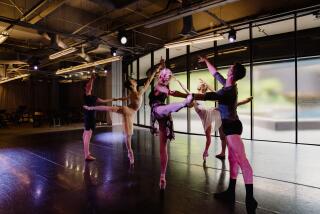DANCE REVIEW : Bolshoi Ballet’s ‘Swan’ Is One Dull Bird
SAN DIEGO — Not long ago, when Americans considered Soviet artists hostages to an evil empire, we accepted the generally appalling state of Soviet choreography as the inevitable price for enjoying the unsurpassed greatness of Soviet dancing.
No longer. The freedoms of a new era have raised everyone’s expectations--and the familiar junk ballets of the 1990 Bolshoi tour seem a double affront. We’ve certainly never been engaged by them, and now the dancers look equally detached.
Tuesday, the company opened its seven-performance engagement at the Civic Theatre with the “Swan Lake” that artistic director Yuri Grigorovich patched together in 1969.
Set in bleak ruins designed by Simon Virsaladze, this is a version that does not actually tell a story but rather makes occasional references to one--as if it’s aiming to be a dreamlike distillation. Indeed, it sometimes becomes literally emblematic when huge, decaying coats of arms descend to ornament major junctures in the action.
Instead of the mime passages of the original that represented conversations in movement, Grigorovich has people stand around mindlessly bowing to one another or simply waiting until the music allows somebody to dance. He further wrecks the work’s built-in stylistic contrasts by putting the national dances onto pointe--but remains a staunch traditionalist regarding those three fixtures of Soviet stagings: the Tutor, the Jester and the happy ending.
Diligently conducted by Algis Zhuraitis, the Tchaikovsky score has been reworked to incorporate passages deleted from most productions--including the long-lost Russian dance. The most troublesome novelty: an intense pas d’action for Odile, Rothbart, Siegfried and a swan mini-corps just preceding (and in a completely different style from) the Black Swan pas de deux.
Gone are the days when this confused and fundamentally hollow collage could command committed execution. Look at the swans in the first lakeside scene: Like the corps, the four cygnets dispatch their choreography efficiently but with no real spirit--and the swan trio that immediately follows proves disastrous in both timing and placement.
Look at the vulgar and unmusical bravura assigned to both the meticulous Mikhail Sharkov as the Jester and the reckless Alexander Vetrov as Rothbart. In the name of expanding opportunities for males in “the classics,” Grigorovich has made such men into caricatures of disruptive athleticism.
What happens to artists condemned to this kind of showcase? They either grow grimly insular (Vetrov) or descend into fey mannerism (Maria Bilova, cast on Tuesday in the pas de trois of the opening scene). This is a company with plenty of examples at both extremes.
Because vestiges remain of Petipa and Ivanov, this “Swan Lake” becomes periodically classical, allowing the Swan Queen and Siegfried (no less than the audience) access to something authentic and purposeful.
On Tuesday, the triumphant dynamism of Nina Ananiashvili complemented the serene refinement of Alexei Fadeyechev in unexpected but exciting ways. With her extraordinary upper-torso strength and magnificent ability to flow through the choreography, Ananiashvili danced even the most lyrical passages at heroic scale. Yet the sweetly smiling Fadeyechev made her appear a projection of his needs: a dream-lover he conjured up and then protected with partnering of ravishing tenderness.
Fadeyechev wasn’t always faultless in the virtuoso challenges, and Ananiashvili looked oddly prosaic in her first lakeside solo (after the White Swan duet), but nevertheless they exemplified the brilliant abilities of this Bolshoi generation--abilities deserving something better than Grigorovich’s botched modernization of a 19th-Century masterwork.
Can they hope to find what they deserve within this company or elsewhere in Moscow? In Leningrad, perhaps? In London? The question is anything but speculative these days, and the reputation of the Bolshoi anything but assured.
More to Read
The biggest entertainment stories
Get our big stories about Hollywood, film, television, music, arts, culture and more right in your inbox as soon as they publish.
You may occasionally receive promotional content from the Los Angeles Times.










